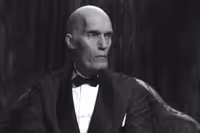The end of the Hedwig movie: WTF?
#25The end of the Hedwig movie: WTF?
Posted: 11/17/18 at 2:41pm
darquegk said: "I once read an argument someone made (here? on Facebook? Musicals dot Net?) that there WAS no Hedwig and there WAS no Tommy, but that applied more to the stage show than to the movie.
I think the gist of it was that the character the actor is playing is not actually Hedwig or Tommy, but is playing a drag performer working through issues of self and identity with an allegorical story, trying to reconcile two halves of the whole with tall tales about a botched sex change on one hand and rock stardom on the other. When the wig and costume come off, we are no longer seeing Hedwig or Tommy, but seeing The Cabaret Artist, no longer hiding behind fake names and exaggeration, just naked and honest and Themself.
I don't think this interpretation entirely plays, but it stuck in my mind anyway."
We toyed with a variation of that idea when I played Hedwig:
That you weren't seeing Hedwig perform. You were seeing Sondheimite tell you a story as Hedwig. Kinda like the Shaman storyteller telling their tribe allegories about life.
There's also the line of thinking that Hedwig doesn't exist and that Hedwig is Tommy moonlighting because he feel like he can't "come out" and keep his career/fame/family/image.
#26The end of the Hedwig movie: WTF?
Posted: 11/17/18 at 3:32pmI've heard the Hedwig IS Tommy one also, and it has the same problem: it's a little too much meta thrown at a show that's ALREADY incredibly meta.
#27The end of the Hedwig movie: WTF?
Posted: 11/17/18 at 3:34pm
.... Why was my post about Hedwig being Tommy deleted?
Why do I only seem to have post deleted on Saturday/Sundays?
#IHATEWeekenedModerator
#28The end of the Hedwig movie: WTF?
Posted: 11/17/18 at 4:51pmI don’t know if it’s the mods. I think every 25th and 26th posts in any thread can disappear randomly into the virtual crack between pages.
#29The end of the Hedwig movie: WTF?
Posted: 11/17/18 at 5:50pm
I didn't see the Broadway revival, and the movie is another matter, but, other than Hedwig's transfiguration into Tommy, I thought the original Off-Broadway production was very straightforward, and I'm assuming the revival was the same. Even still, I didn't think the transformation was that abstract, and my interpretation of the ending is that Tommy Speck/Gnosis, a real person, was Hedwig's other half, but, on a larger scale, he represented the half that was actually in Hedwig the whole time. Therefore, Hedwig was complete within himself, and could stop searching for his other half, and his identity. Hedwig was Hedwig, and that was enough. I apologize for using the male pronoun, but, to me, Hedwig was a boy who was forced into living life as a female. That doesn't make him one, and I think that's one of the points that the show was trying to get across.
Updated On: 11/17/18 at 05:50 PM#30The end of the Hedwig movie: WTF?
Posted: 11/17/18 at 6:22pm
I think the show- and the movie- are straightforward. Hedwig has a breakdown that leads to the epiphany, in the form of Tommy Gnosis’ reprise of “Wicked Little Town”, that Hedwig never had anything completely taken- his identity, his gender, his art- because those things are only as fixed as one lets them be. Fittingly, the breakdown comes during a song called “Exquisite Corpse”- an artistic exercise in which multiple people incrementally create a rendering of a whole body without knowing what the others have done.
Up until then, Hedwig was defined by the things that had been done to him, and at the end resolves to define himself.
#31The end of the Hedwig movie: WTF?
Posted: 11/19/18 at 7:54pm
Jane2 said: "Yes Joe, Hedwig holds a special place in my life. I was hooked after seeing it for the first time. I virtually never left the theater!
Having seen all the NY Hedwigs in all the shows, I've had enough time to digest it and figure it out for myself, at least."
Jane... or anyone, really... Are you going to the concert at Town Hall? I’m so excited-I’m busting. I don’t know how I’ll make it to June.
#32The end of the Hedwig movie: WTF?
Posted: 11/20/18 at 10:27am
Using the pronouns people elect to use is pretty simple and straightforward. Who knows what pronouns Hedwig would have chosen in a sequel. The show uses female ones. She's more than a woman or man, but it's not hard to use the gender identifiers the person herself uses.
The ending is clearer in the show than the movie, imho. Tommy is real, but also a fantasy/obsession. I've always thought Wicked Little Town reprise happened in her head when she was finally ready to let him go. And she also let go of the idea that there is a pre-ordained other half, so she's finally whole. Once she accepted herself, she could accept Yitzhak. Giving him the wig is her allowing him to be himself.
Videos





